Baldur's Gate 3 mimics the framework of the tabletop RPG Dungeons & Dragons, wherein players will exhibit competence in specific abilities. Some of these proficiencies come into play during battles, while others aid players in conversing with non-player characters.
Every decision players take while customizing their character, such as selecting the class and background, will impact the skills their character excels in. With eighteen skills on offer, each character can only excel in a limited few. Considering this, here are the optimal proficiencies that players should focus on to enhance their upcoming adventures.
Table of Contents
8. History
While History might be considered uninteresting or uninspiring by certain individuals in the real world, its counterpart in Baldur's Gate 3 (BG3) can provide players with crucial contextual insights as they explore their surroundings. Characters who possess proficiency in History, an Intelligence-based skill, are better equipped to recall past events they've learned about.
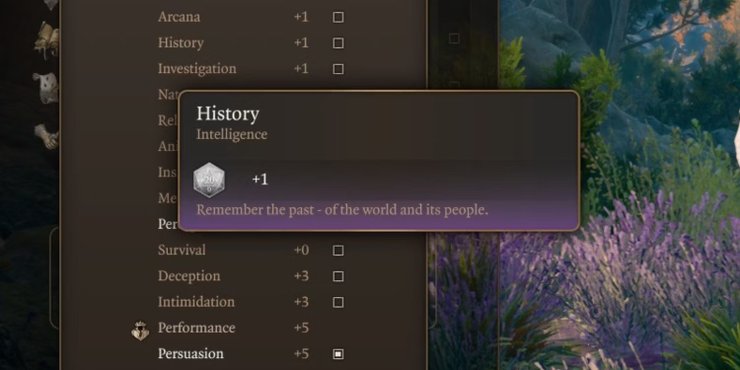
This capability can prove invaluable in aiding players' comprehension of certain encounters. For instance, in Act One, players might enter a dilapidated temple. With a proficiency in History, they're more likely to recognize that this temple was dedicated to a deity no longer venerated in the world of BG3.
7. Acrobatics
Dexterity stands as a trait that numerous classes are prone to having elevated values in, particularly those engaged in ranged combat like Rangers. Regarding abilities guided by Dexterity, players ought to channel their expertise into Acrobatics. Characters possessing proficiency in this skill are apt to gracefully recover their balance during moments of agility. Furthermore, it holds significant value in combat scenarios.
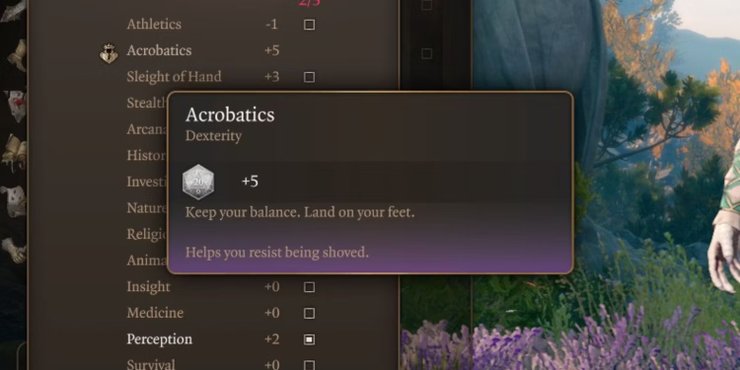
An element within Baldur's Gate 3 involves the potential of being forcefully pushed amid a battle. If a player exposes themselves to this risk, it heightens the chance of a fatal fall. Fortunately, individuals skilled in Acrobatics encounter reduced vulnerability to being toppled, thereby maintaining their resolute stance.
6. Insight
Combat isn't the sole domain where competencies hold significance; this skill based on Wisdom serves as a notable instance. When interacting with NPCs, players might discover themselves confronted with falsehoods. Possessing a strong proficiency in Insight, the game's narration will inform players whether the individual they're conversing with exhibits signs of nervousness or concealing information.
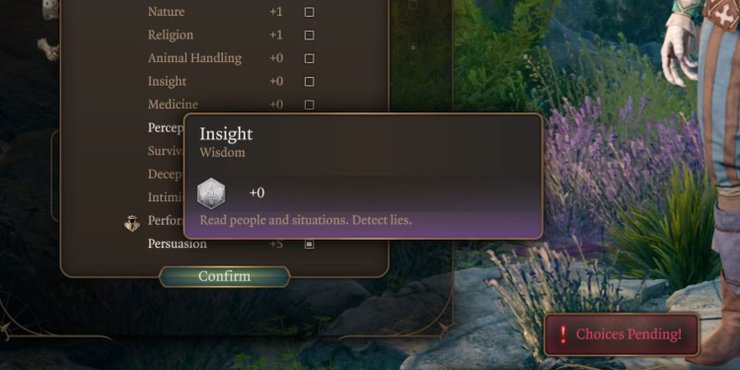
Instances like these can unveil additional dialogue possibilities that players might not have otherwise encountered. Furthermore, the utility of the Insight skill stretches beyond conversations. For specific scenarios, such as recognizing an imminent trap, the Insight skill can forewarn players, offering an added layer of awareness.
5. Investigation
During their exploration within BG3, players will probably stumble upon diverse enigmas that demand thorough examination. Demonstrating proficiency in Investigation proves advantageous when seeking out hints in such instances. While it's conceivable for a player to arrive at a resolution without this Intelligence-linked skill, their odds of success are notably higher if they possess proficiency.
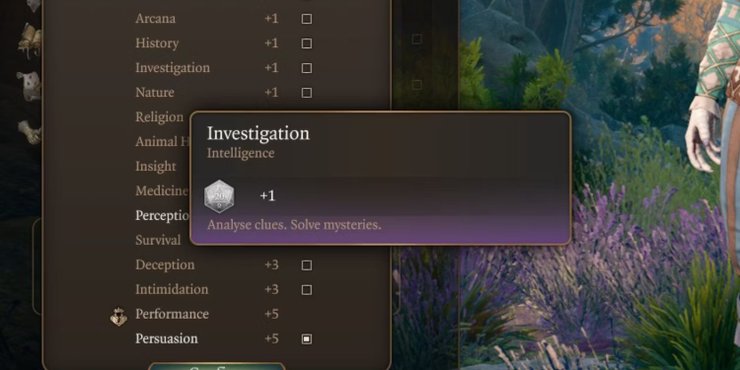
Despite the seeming infrequency of its use, Investigation, akin to History, can contribute pertinent insights to specific situations. Unveiling clues prior to encountering threats is bound to impart a sense of readiness upon certain players, as if they've readied themselves for the imminent confrontation.
4. Athletics
Athletics exclusively aligns with the Strength attribute, with the only other application for this attribute being melee weapons. Nevertheless, this skill retains its significant combat utility, sharing a parallel function with Acrobatics.

Similarly, players who are adept in Athletics are fortified against shoving attempts. Beyond this defensive aspect, the skill aids players in pushing adversaries as well. Consequently, foes who venture too near the precipice experience a taste of their own medicine as they are propelled to their demise.
3. Persuasion
In Baldur's Gate 3, possessing charm holds nearly as much significance as combat prowess. Numerous hazardous or undesirable circumstances can be circumvented through adept verbal manipulation. Among several abilities tied to the Charisma attribute, Persuasion is expected to see the most frequent application.
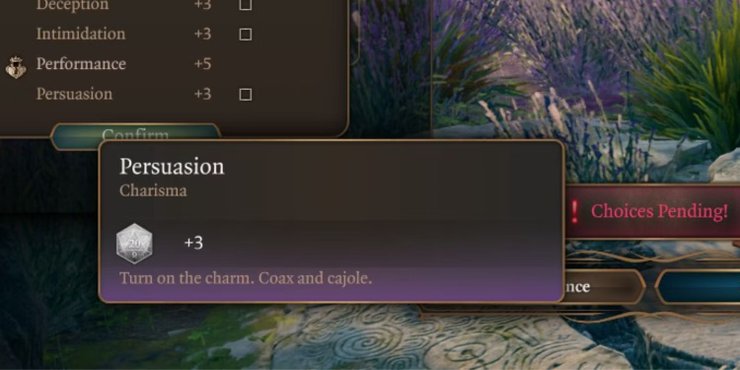
Leveraging the art of persuasion, players can guide NPCs to avert their attention in specific scenarios or glean information from them without parting with a single gold coin. Occasionally, resolving a predicament can be effortlessly achieved by simply engaging in a conversation.
2. Stealth
Any player has the option to skulk and attempt to remain unnoticed, yet those with expertise in Stealth possess the ability to conceal themselves even within plain view. Tied to the Dexterity attribute, Stealth stands as arguably one of the most advantageous proficiencies for players to possess, extending well beyond its applications in illicit activities.

Through adept use of Stealth, players can execute surprise attacks by quietly infiltrating the area and ascending to higher vantage points. Similar to Persuasion, proficiency in Stealth can also enable players to completely evade battles, allowing them to stealthily bypass formidable adversaries who could swiftly overpower the player and their companions.
1. Perception
Among the array of skills accessible in Baldur's Gate 3, regardless of the chosen class, it is imperative for players to invariably possess proficiency in the Wisdom-linked skill of perception. This skill holds an unparalleled significance, granting players continuous awareness of their surroundings.
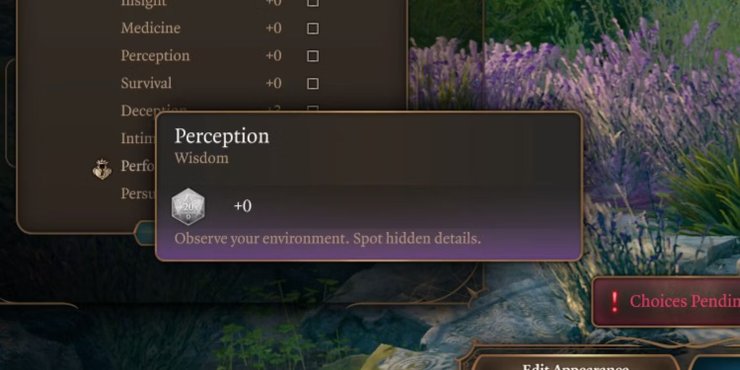
Perception proves invaluable in numerous scenarios, encompassing the ability to discern subtle environmental intricacies that could unveil hidden secrets, as well as detecting instances within conversations where a character aims to divert the player's attention while engaging in pickpocketing.
>>> Read more: Top 5 Best Resident Evil Games To Play In 2023
Larian Studios drew substantial influence from Dungeons and Dragons when designing their classes, all twelve of which are closely tied to their tabletop equivalents. Baldur's Gate 3's available classes are the twelve base classes of D&D 5e: Fighter, Barbarian, Ranger, Rogue, Wizard, Sorcerer, Bard, Warlock, Druid, Cleric, Paladin, and Monk. Each offers a different utility throughout the game. Given the plethora of captivating options, along with numerous subcategories for each, players might find themselves pondering about the optimal class to embark upon.
When starting a game of Baldur's Gate 3, players are able to choose from twelve different classes to create their character (along with seven special origins to pick from if desired.)










Comments